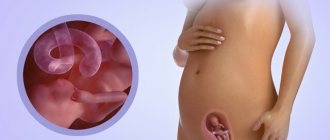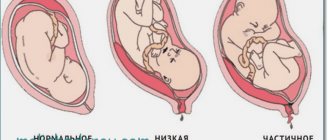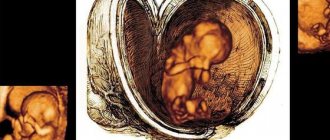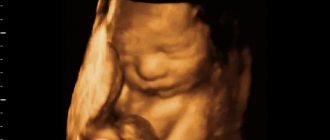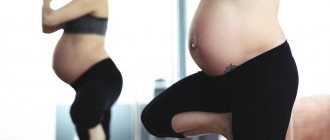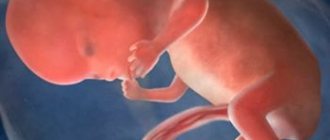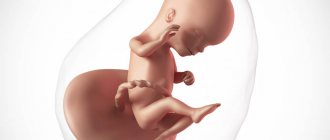The 11th week of pregnancy is the third obstetric month. If you look at the pregnancy calendar by week, then 71-77 days have passed since conception. The eleventh week of pregnancy, precisely the period when the unpleasant effects of toxicosis recede, the tummy begins to enlarge. The time for important examinations is approaching.
Development of the fetus in the womb at 11 weeks of pregnancy.
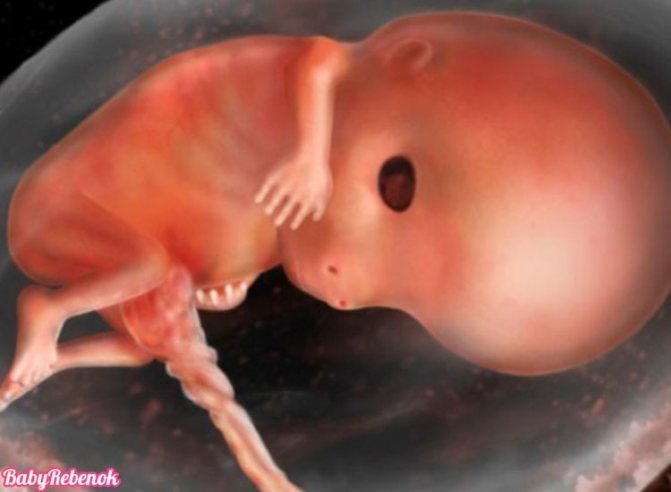
The fetus becomes more and more human-like. While its head is almost twice the size of its body, the weight of the fetus at 11 weeks of gestation is 7 g, and the size of the fetus at 11 weeks reaches about 50 mm. All organs and systems have already appeared; soon he will no longer be so vulnerable to external influences. The fetus actively moves, can raise its head, stretch, and develops a grasping reflex. External sexual characteristics begin to appear - sometimes at 11 weeks of pregnancy you can already determine the sex of the child.
The baby already knows how to urinate - urine enters the amniotic fluid and is removed from the uterus through the placenta. His intestines begin to make movements reminiscent of peristalsis. The liver develops very actively - it occupies a large volume of the fetal abdominal cavity.
The nervous system develops. The fetus begins to feel external signals, it develops a sense of smell and taste - now it feels what its mother is eating, and it even develops its own preferences. At 11 weeks of pregnancy, the palms become sensitive. The diaphragm has developed, and sometimes the baby may hiccup.
A major event occurs in the fetal immune system at 11 weeks of pregnancy - lymphocytes begin to appear.
What will an ultrasound show at 11 weeks of pregnancy?
Usually at this stage an ultrasound is performed, in which you can hear the baby’s heart beating and see how he moves. The first ultrasound at 11 weeks of pregnancy is usually done as a safety net, to exclude any abnormalities. Ultrasound allows you to assess the condition of the fetus, placenta, uterus, and is included in the screening of the first trimester.
Risk factors
It is believed that by the 11th week, that is, with the onset of the fetal period of the child’s development, the risk of spontaneous abortion decreases by 10 times. However, the expectant mother should not relax and if any disturbing symptoms appear, she should immediately seek medical help.
The 10th - 11th week of pregnancy is a time when your baby is well protected from external infections, but the mother should be wary of rubella. Also, during this period, you should not resort to treatment using anesthesia (for example, at the dentist): such measures are permissible only after 12 weeks.
Nutrition at 11 weeks of pregnancy
The nutrition of the expectant mother is the basis of her child’s health; she must pay attention to this issue. Nutrition should be complete and balanced.
- Be sure to get enough calcium in the 11th week of pregnancy - for the baby's growing bones and teeth.
- Proteins are the building material for the entire body of the fetus, so you also need to eat enough of them.
- Iodine affects the development of the nervous system, especially the brain.
- Any vegetables and fruits that do not cause allergies, lean meat, cottage cheese, cheese and other dairy products are good for a pregnant woman.
- White cabbage, bell peppers, currants, rose hips, beets, watermelons, melons, and cucumbers will be especially beneficial. It is better to eat watermelons and melons as a separate meal to avoid upset or bloating. Vegetables should be eaten not only raw, but also cooked.
- You cannot eat raw fish, raw eggs, poorly fried meat, alcohol and foods that cause allergies are definitely excluded.
- You need to drink enough, preferably water without gas and dyes, compotes, fruit drinks.
- The 11th week of pregnancy is the period when strange food desires arise. In this way, the body tells what mother and child need at the moment. This is what you should eat, but within reasonable limits: fried and fatty foods should be excluded if desired.
- It is important that vitamins are present in food, especially E, C and group B.
Physical activity
At week 11, many mothers try to lead a sedentary, or even better, recumbent lifestyle, believing that in this way they contribute to a calm pregnancy. It must be said that this is a big misconception. Regular physical activity will benefit both the child and the pregnant woman. They improve mood, increase the overall tone of the body and help cope with a number of problems: lower back pain, constipation and hemorrhoids, stretch marks and swelling.
So, in the absence of a threat of pregnancy, doctors recommend that women engage in the following sports:
- Water aerobics and swimming.
These are the most gentle types of training for expectant mothers, because thanks to water, the load on the muscles during exercise is not as high as on land. - Walking and running.
It is recommended to practice these sports outdoors. It is advisable not to overdo it with the load, focusing on your well-being. - Aerobics and fitness in the gym.
Thanks to such exercises, a woman’s cardiovascular system is strengthened and her muscles are trained. All this is useful for the mother who is about to give birth. - Yoga.
Helps you relax, tune in to the positive, and master breathing techniques.
Sex at 11 weeks pregnant
It has been proven that if pregnancy proceeds normally, sex only brings benefits. During physical intimacy, lubricant and sperm are released, which have a positive effect on the condition of the uterus. Of course, you need to exercise some caution and use positions with shallow penetration.
If there is a threat of interruption or pain, then it is better to refrain from intimacy.
But in most cases, it is good for both the physical and psychological state of a woman, in addition, during pregnancy, libido increases in some women.
Proper nutrition
The main directions of menu formation are to provide the fetus with material for full growth and development in combination with the prevention of constipation in a pregnant woman.
Basic principles of healthy eating at week 11:
- A sufficient amount of animal protein (meat, fish, fermented milk drinks, milk).
- The presence of vegetable protein (a small amount of legume dishes).
- Eating fruits and vegetables of different colors to fill your diet with vitamins, antioxidants, and microelements.
- Including a source of calcium and protein such as cottage cheese and cheese in the menu.
- Limit refined foods and light carbohydrates to prevent constipation.
- Drinking enough fluid (1.5-2 liters per day).
- Including kiwi, bananas, dried apricots, and prunes in the diet to stimulate intestinal motility, as well as a source of calcium.
Don't overeat, eat for two. It is better to practice eating small amounts of food frequently. The best cooking method is oven baking or steaming. It is better to exclude fried and pickled foods from your menu for now.
Twelfth week for the expectant mother
Twelve weeks is rightly considered the best period in pregnancy. The woman’s well-being returns to normal due to the transfer of control of the process from the corpus luteum, which produced progesterone, which is the culprit of many troubles, to the placenta. All manifestations of toxicosis disappear, women become relaxed and calm.
At this stage, the uterus has already grown sufficiently and has reached the edge of the pubis, but this is not capable of affecting the shape of the abdomen.
As a rule, the first trimester is not accompanied by weight gain. If toxicosis manifests itself to a significant extent, even weight loss is possible. If a woman's appetite has not changed as a result of pregnancy, she should gain no more than 10% of her total weight during the entire pregnancy. This increase is usually 1-2 kg.
From the twelfth week, if the woman is doing well and there are no contraindications, it is recommended to start playing sports. At earlier stages they are not dangerous, but most often experts recommend that women take care of themselves after the completion of the first trimester.
For an expectant mother, dancing, yoga, swimming, fitness, and any other type of activity that was designed specifically for pregnant women are perfect. Before starting training, you should definitely consult a doctor. If you choose the right loads, classes will have a positive impact on the course of not only pregnancy, but also childbirth. Also, sports at this stage will contribute to a faster recovery after childbirth.
Screening for pathologies of fetal development
In each trimester of pregnancy, fetal health screening is carried out - a set of diagnostic measures to identify possible deviations from normal development. These studies do not categorically state the presence of pathologies, they simply suggest the likelihood of their occurrence.
First trimester screening is performed from 11 to 16 weeks of pregnancy. The optimal period is the beginning of this period, since before the 12th week the parameters of the fetal collar zone are clearly visible on ultrasound.
In addition to ultrasound, 1st trimester screening includes a “double test” of a biochemical blood test to determine the level of human chorionic gonadotropin (hCG) and the level of plasma A-protein (PAPP-A) to determine the risk of Down syndrome and Edwards syndrome. Their average value should not be less than 0.5 units; a value above 2.0 units when combined with the norm of other studies is a normal result.
Video about first trimester screening, interpretation of its results, useful products:
Feelings of the expectant mother
At the eleventh obstetric week of pregnancy, the bond between baby and mother strengthens. The placenta begins to work at full capacity. Frequent urination remains, problems with bowel movements and it becomes difficult to sleep on the stomach. You may experience aching pain in the lower back caused by stretching of the ligaments that hold the uterus.

Mild nausea.
By the end of the first trimester, in the eleventh week, most pregnant women experience toxicosis, but in some cases it can last another couple of weeks.
Headache.
Changes in hormonal levels are accompanied by headaches, which should subside in the second trimester. The placenta works at full strength and increases the volume of blood that circulates through the cardiovascular system. Increased stress on the body can lead to dizziness and mild nausea.
Decreased concentration.
Progesterone has a calming effect on the expectant mother's brain. Reducing the level of emotional reactions protects mother and baby from stress and strong feelings.
Heartburn and impaired peristalsis.
Progesterone is produced in a woman’s body in large quantities and affects most of her organs and systems, including the functioning of the digestive system. The hormone provokes heartburn, diarrhea, constipation and increased gas production.
Brittle nails and hair.
For growth and development, the baby requires vitamins, minerals and trace elements, which he receives from the mother’s body. Lack of calcium has a very negative effect on the condition of a woman’s nails, hair and teeth. In order to solve the problem of mineral deficiency, you need to properly balance your diet and take vitamin supplements for pregnant women. The doctor will select the drug and determine the required dosage.
What to discuss with your doctor
- What screening results will require additional genetic testing and genetic counseling?
- Find out when you should stop taking folic acid. It is believed that closer to the second trimester, a pregnant woman does not need to take it additionally.
- Get advice on what to do if your stomach suddenly hurts, bleeding appears, or your blood pressure drops. You should always have the phone numbers of your doctor and emergency services at hand.
Tenth week for the expectant mother
The woman feels increased anxiety and remains emotionally unstable. All this is a consequence of ongoing hormonal changes. The only thing you should understand is that balance will soon be restored, and therefore a stable good mood will return.
With the manifestations of toxicosis, the situation changes. Nausea begins to bother you less and less, and vomiting, as a rule, stops altogether. Nausea mostly occurs only in the morning. If toxicosis goes away completely, increased appetite may occur. At this time, it is important to monitor your diet and prevent sudden weight gain. It is necessary to avoid overeating and consuming high-calorie foods. For a woman in this position, this is harmful and can cause shortness of breath, swelling, and deterioration in well-being. Excess weight is the reason for increased load on all systems of the body, which already spends a lot of energy on the development of the fetus.
Women in the tenth week may notice a change in their abdomen. The cause may be overeating, as well as redistribution of subcutaneous fat and muscle relaxation due to the influence of the pregnancy hormone progesterone.
The uterus enlarges during this period, but not enough to affect the shape of the abdomen; it reaches the size of a large apple or grapefruit. Accordingly, pregnancy is still completely invisible to others.
Mandatory tests
When visiting an antenatal clinic at 11 weeks of pregnancy, you will be asked to take the following tests:
- Blood test for hormones,
- A general urine test to determine the level of leukocytes and protein.
Deviations from the norm in the level of protein and leukocytes may indicate an inflammatory process occurring in the body.
The level of hCG in a woman’s blood reaches its peak at 11 weeks. This hormone provided the necessary levels of estrogen and progesterone throughout the entire 1st trimester, maintaining the normal course of pregnancy. From this moment on, the functions of hCG are performed by the placenta.
Interesting Facts
| Options | Indications |
| Time from conception | 9 weeks |
| Period by month | 11 weeks |
| What month | 3 |
| Dimensions and weight of the fetus | 40-60 mm, 8-10 g |
| Uterus dimensions | In the pelvis, about 11 cm in diameter |
Your baby is the size of
Lime
40-60mm Size
8-10 g Weight
Your pregnancy is 11 weeks, the development of the fetus and the sensations during this period worry you most. And this is understandable. Your body is changing, responding differently to the new life inside and the associated hormonal changes. Anxiety will decrease if you better understand what is happening with mother and baby, what symptoms should alert you, and what you should not pay attention to.
Let's figure this out together, but first let's decide on the timing:
- 11 weeks of pregnancy is how many months? This is almost three months, the 1st trimester is ending.
- It has been 11 weeks since my last menstrual period. This is an obstetric method for calculating the gestation period. If you are counting from conception, then you are at 9 weeks.
